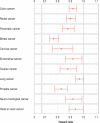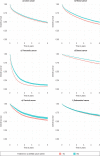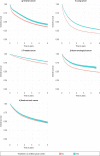Initial Cancer Treatment in Certified Versus Non-Certified Hospitals
- PMID: 37583089
- PMCID: PMC10622058
- DOI: 10.3238/arztebl.m2023.0169
Initial Cancer Treatment in Certified Versus Non-Certified Hospitals
Abstract
Background: According to the National Cancer Plan in Germany, all cancer patients should receive high-quality care in accordance with evidence-based treatment guidelines. Certification programs were established for this purpose but have not yet been comprehensively evaluated.
Methods: In the WiZen project, which was supported by the Innovation Fund (supported project number 01VSF17020), controlled cohort studies were performed to investigate whether initial treatment in hospitals with or without a certificate from the German Cancer Society was associated with a difference in overall survival (primary endpoint) in patients with cancer of the colon, rectum, lung, pancreas, breast, cervix, prostate, endometrium, and ovary, head and neck cancer, and neuro-oncological tumors. The studies were based on nationwide data from adult insurees of the AOK statutory health insurance carrier for the years 2009-2017.
Results: The majority of patients with all entities except breast cancer received their initial treatment in non-certified hospitals. Initial treatment in a certified hospital was found to be beneficial in terms of overall survival for all cancer entities, even after extensive adjustment for patient- and hospital-related confounders. The hazard ratio (HR) ranged from 0.97 (95% CI: [0.94; 1.00]) for lung cancer to 0.77 [0.74; 0.81] for breast cancer, corresponding to an absolute risk reduction (ARR) for overall survival of 0.62 months for lung cancer to 4.61 months for cervical cancer.
Conclusion: The WiZen study shows for the entities studied that initial cancer treatment in a certified center is associated with lower mortality. Despite the recommendations of the National Cancer Plan, however, more than 40% of all cancer patients still receive their initial treatment in a non-certified hospital. The preferential provision of initial care in certified hospitals would be likely to improve overall survival. Although the study design does not permit any conclusion with regard to causality, the findings seem robust considering that a control group was used, confounders were taken into account, and the study population was of large size.
Figures




References
-
- Robert Koch-Institut (eds.) Gesundheit in Deutschland. Gesundheitsberichterstattung des Bundes. Gemeinsam getragen von RKI und Destatis. www.gbe-bund.de/gbe/ (last accessed on 23 March 2023)
-
- GEKID; ZfKD. Berlin: Robert Koch-Institut; 2021. Krebs in Deutschland für 2017/2018.
-
- Statistisches Bundesamt (Destatis) Krankheitskosten: Deutschland, Jahre, Krankheitsdiagnosen (ICD-10), GENESIS-Online (23631-0001) www-genesis.destatis.de/genesis//online?operation=table&code=23631-0001 (last accessed on 23 March 2023)
-
- Bundesministerium für Gesundheit (Hrsg) Nationaler Krebsplan - Handlungsfelder, Ziele und Umsetzungsempfehlungen. Berlin: BMG. 2012
Publication types
MeSH terms
LinkOut - more resources
Full Text Sources
Medical

